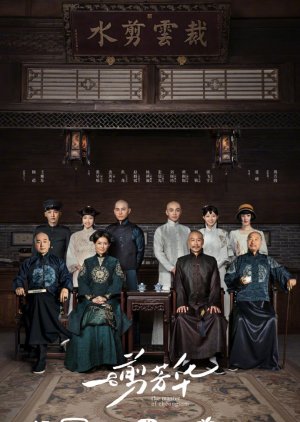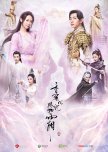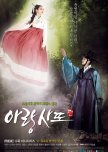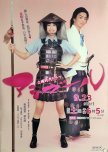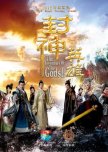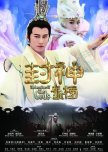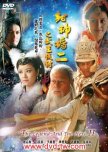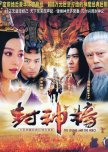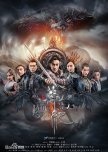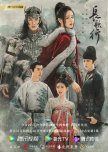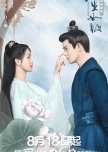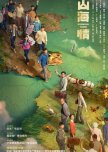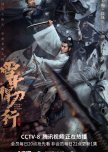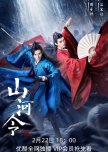
A cut above.
This is a wonderfully produced drama that deserves a lot more attention. It is a riveting tale of sibling rivalry that spans a time of rapid change and turbulence in modern Chinese history. Jiang Mosheng and Lu Yuanzhi are both adopted and apprenticed by Master Su Jingan of Sancai (Triple Cut) House, couturier of the Qing Imperial Court. Sancai House routinely outshines other rival houses in the workmanship, symbolism and design of the intricate ornamentation of the Dowager Empress' court robes, allegedly due to their seamless stitch, a tradecraft that is passed down from one generation to another. Master Su's most bitter rival is his former fellow apprentice, Master Bai Henian of Sihe House.Jiang Mosheng is the older, steady, responsible brother and heir apparent, whose great talent is meaningfully enhanced by his passion and dedication. Lu Yuanzhi is the hot headed, audacious and visionary brother; a rare talent whose brilliance is nothing short of genius. His recklessness however lands him in serious trouble. To save him, Mosheng cuts ties with Sancai House, defects to Sihe House and accepts Master Bai as his foster father. This sets the brothers down a complicated path of reluctant rivalry, conflicting loyalties, mutual friendships, convenient alliances, mistrust, betrayal and forgiveness. The most prominent feature of this drama is the Abel and Cain relationship between the brothers and it is well written, consistent and riveting. Both of them are flawed characters and neither is completely blameless for how things play out between them. Although Yuanzhi learns to rein in his recklessness and temper as he matures, it still manages to get the better of him. His culpability over Mosheng's sacrifice constantly lingers in the air between them. Even though he can be such an ass, I have to sympathise with Mosheng's battle with his own worst instincts in the shadow of someone who is perpetually a cut above. Both Zhang Haowei and Hong Yao delivered excellent, empathetic performances, alternately frustrating, enraging and beguiling me at all the right moments.
How the design of the cheongsam or qipao evolves to reflect the changing attitudes of times is the main, fascinating centrepiece of the drama. While not in the same league as the more modern and sophisticated qipaos of Wong Kar Wai's iconic In The Mood for Love, all of the outfits from the Qing court robes to the Western flapper dresses are simply gorgeous and I truly enjoyed the mini history of Chinese costume. How the female characters are dressed is also symbolic of who they are - Yaoyao is a remnant of the past at sharp contrast with Lijun, the ultimate, progressive modern woman. Kang Ning sits in the middle - she embraces change in a way that marries it with tradition; and thus she is truly Yuanzhi's muse. True to character, both Kang Ning and Lijun have a very refreshing attitude towards relationships and love that I truly enjoy and they fight to write their own stories even when events conspire against them. The only character I didn't like is Yaoyao who is your typical c-drama archetype but she is written that way as a foil for the other two. There are enough dimensional, grey and consequential characters in this drama that I am very satisfied with the character aspects of it. Most of these key roles are performed by veteran actors whose acting often surpasses the quality of the dialogue. I laughed my head off at the dynamics between Lijun, Feiyu and her father.
This is largely a character driven drama where the main characters have to cope with the changing times as they transition from the Qing era to the Republican era and Japanese incursion. While the pace is fast with many exciting and unexpected turns along the way, not all of the sub plots and arcs are consistently well written. Some of the stressing events that the main characters face are a bit contrived, can be lazily written and at times defy logic. But between excellent acting and all the interesting character developments, I found the plot holes quite easy to forgive. I do appreciate how all of the characters go through rough times, experience loss, how actions have consequences and justice is often blind. The villains are decent but less interesting than the characters themselves, some of whom are quite grey if not outright vile.
I am happy to recommend this as a very enjoyable watch with some good fresh takes on old tropes. Overall for me this is an 8.0.
Was this review helpful to you?

This review may contain spoilers
Watch this at your own expense
STORY :
1 / THE QING Dynasty era:
This part of the drama has the most horrible and outrageous plotline I have seen in a while. It will present you with:
- a man who kills his godson and is never troubled because of it
- a man who uses the corpse of his victim like an accessory to frame other people
- a man who schemes plenty of plans to harm his brother but he gets away with it because he just misunderstood the situation
- a man who pays a thug to break someone's arm and he is never troubled about it even by his godson who knows the truth
- a man who knows all the crimes his godfather did against his brother but he would not do anything to help the brother out of jealousy but still call him his brother.
- a princess who is forced to marry at gunpoint on the head of her father but the husband does not sleep with her because she is not his "kind of woman". Of course. Like a pig would not eat jam.
....
Plenty of cranky farfetched unrealistic situations with iffy morals and messages like "I caused you to die but sorry for the misunderstanding and justice is not necessary as we are family".
Is this supposed to be entertaining? It is not. It is BS.
2/ THE REPUBLICAN era:
The drama becomes a lot better.
- The FL disappears as the plot is only centered on the ML
- The ML discover a new city (Shanghai), new people, new challenges. He starts to build his career and success.
- The Republican era is a time of change so the drama is richer of ideas and events
- The directing is better with nice slow mo
- The plotline is crafted with a good twist
- Then back to Beijing , back to family dumb misunderstandings
- FL appears again. Her story is quite sad.
3 / FIGHT VS JAPANESE
The usual great patriotic courageous Chinese brothers vs. the evil monstrous Japanese who kill innocent people just to bully and coerce and achieve their goal. Grotesque ending to give the bad guy his redemption when we have barely a glimpse at the main leads happy ending.
CHARACTER :
- Kang Ning : beautiful and smart and courageous, the writing of her character turned ludicrous and made her a props for 2/3rd of the drama
- Lu Yuan Zhi : idiot guy who improved himself as a great tailor but his personality is bland always trying to save his love and help his brother who constantly creates troubles for him.
- Jiang Mo Sheng : Terrible brother insecure and jealous. Does plenty of mistakes but accuses the others.
- Zhao Li Jun: Fun endearing and a fighter. I liked her.
- Su Pei Yao : Spoiled daughter
- Bai He Nian : Guy should have died sooner for the sake of his family.
- Guo Fei Yu : started a fool but had a good character development. Good guy.
OST:
Nothing special
REWATCH:
No. Packed with outrageous schemes. Nothing really enjoyable.
OVERALL : This drama is well produced with great costumes, places, props, many characters... It is too bad it drowned itself in family schemes and misunderstanding to promote usual family values and forgiveness and redemption blabla. The story is also amoral : the person who kills his Godson is never accountable but lives free. Also the endings of the master of Si He house and the bad brother are quite ridiculous.
Was this review helpful to you?

This review may contain spoilers
The Dramatization of Cheongsam History
The overall story is interesting, talking about famous traditional Chinese dress called Cheongsam or in other term Qipao (long dress).It’s taking the event of the fall of Qing Dynasty and the start of China revolution to become the republic. This also describes the rise of Chinese fashion during that era where women fight for a more equal right to men and has the right to “show” their body more (in a positive way) to express independency and a new era generation.
The production is good where you can see lots of beautiful dresses made. Kudos to the wardrobe team. The cinematography also good – they uses kind of sepia color in some part to emphasis on the condition of that particular era. Not using full white bright light.
The set also well-chosen the old Beijing part of town. The imperial palace. The old Shanghai area. In Beijing during late Qing dynasty era, the use of horse cart, rickshaw, and car blend in showing the transformation era from old to modern world. The depiction of Shanghai as fashion city in that era.
The plot was two family of tailors, The Su family of Triple Cutting House, Su Jing An and The Bai family of Sihe House, Bai He Nian. Both are well known tailor during late Qing Dynasty due to their workmanship and beautiful design embroidery. Both competing each other to become official imperial tailor.
Initially, Su Jing An and Bai He Nian came from the same grand master of tailor. The Bai should have been inherited the legendary Seamless Stitching technique for his grand master. Bai He Nian was sent by his master to out of town for business trip, unexpectedly before Bai return, the master passed away, with no chance of passing the technique to Bai. There is a manual book of Seamless Stitching technique and when the master passed away, it was given to Su Jing An without actually teaching it, just handing over the book. This event creates severe rivalry between the two for many years.
The Su family has 2 main disciples Lu Yuan Zhi and Jiang Mo Sheng. These two grew up together and create strong brotherly bond. Su also has a daughter, Yao Yao and the three of them grew up together, taking care each other and cares for each other. In the coming age of adulthood, the relationship become complex and starts the triangular relationship.
The Bai family is kind of unfortunate in terms of family linage and only has a god son as sole disciple of Bai He Nian.
Lu Yuan Zhi is a more carefree character but with strong principles to hold justice and an upright person. Jiang Mo Sheng is more reserved and calculating person with high ambition to become the best tailor. Both actually compliment each other and Su Jing An put more hope in Jiang Mo Sheng because he is seemed more talented while Lu Yuan Zhi character which is more playful is never been taught how to make dress. Yuan Zhi secretly learn from Mo Sheng. But with his natural talent, open minded, carefree, intelligence, full of ideas, he is actually a better tailor.
The rivalry between two person, Su Jing An and Bai He Nian spreads through out the family as well between Lu Yuan Zhi/Jiang Mo Sheng and The Bai’s god son. In one instance these disciples involved in street brawl where Bai’s god son unexpectedly died. With rage, Bai He Nian want to use this event to take down Su Jing An and his Triple Cutting House by putting Yuan Zhi in jail and demand a life for a life payback.
To save Yuan Zhi, Mo Sheng agreed to become Bai’s god son to replace his late god son.
Since this event the rivalry now not only between Su Jing An and Bai He Nian but also between Yuan Zhi and Mo Sheng, the so called brothers, forcedly become opponent and rivals.
And the story developed and revolve around this brotherhood rivalry.
The first part of this drama talks about the late Qing dynasty and how the two tailor houses fight each other to gain favor from the imperial court, i.e., the Empress Dowager. In this part the story is very interesting on how both families strive their best to create ultimate wardrobe to pleases the Empress Dowager within the limitation of palace rules and taboos. This is when Yuan Zhi meets with love of his life, princess Kang Ning. They create bond and start helping each other and then falls in love. But along the way, they face lots of hurdles and challenges.
Second part is when Yuan Zhi was running away to Shanghai due to failed attempt in helping Kang Ning run away from her forced marriage. Here Yuan Zhi struggles to gain footing in the tailoring industry in Shanghai to become a renown Cheongsam tailor.
Third part is when Yuan Zhi back to Beijing to reopen Triple Cutting House and to find Kang Ning and save her from Opium addiction.
Last part is when Japan trade commission trying to rub on brotherly rivalry as their way too dominate the tailor and clothing business in China. In this part, conflicts between Yuan Zhi and Mo Sheng is inevitable, where Yuan Zhi is anti-Japan while Mo Sheng works together with Japan.
First part is very good and interesting. Second part starts to become long winded. Third part is even worse and bit boring because the pace is slowing down. Last part starts peaking up again.
Personally, I don’t really like Yuan Zhi character – though he is smart and lots of ideas, having principals, upright and hold justice, he rarely think of the consequences of his action that always causing him or his family trouble that needs to be resolved by sacrificing others. All the conflict in this drama started with Yuan Zhi challenging Bai’s god son and have street brawl which ends up being used by Bai He Nian to crush Su family. If that didn’t happen, we don’t have this drama. That single event creates this 40-episode drama.
To my surprise, I personally admire Bai He Nian character. Despite of being a villain between Su and Bai rivalry, Bai He Nian is actually man of principle and fight for his right. His hatred toward Su Jing An is understandable, his emotion to crush and destroy Su’s Triple Cutting House is justifiable. He took Mo Shen as god son and stick to his decision, love him, nurture him, give him confidence to compete with Yuan Zhi, inherit him the Sihe House and strive to make Sihe House flourish. He burry his hatches once he has fulfill his wish in crushing Su Jing An and not dragging the hatred towards Jing An wife and daughter. He rejects Japan clothing and loyal to his Chinese heritage. Really awesome character.
The chemistry between Yuan Zhi and Kang Ning also not developed well. In the first part of the drama where they interact quite often – it is just a transactional relationship. He helped her, she helped him. Even when the romance between them developed, it is not clear when it is developed and progressing. Seems like after several interaction then Yuan Zhi madly in love with her.
So overall it starts good but then become a bit dull and boring. You just want to skip and find out what next and what will be the ending. If you patient enough, you press fast forward. If not then it’s okay to skip some episodes just to find out about the ending.
The side stories, although related to the main story – they are just adding some complication and make the drama longer.
Was this review helpful to you?

